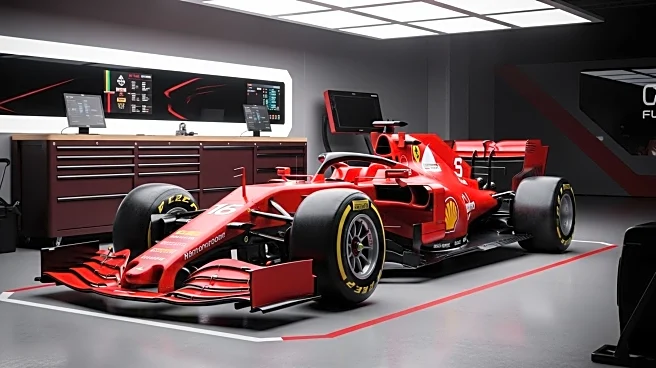What's Happening?
Lewis Hamilton's partnership with Ferrari has been under scrutiny as the seven-time Formula 1 champion struggles to adapt to the team dynamics. Despite securing a victory in the Chinese Sprint Race, Hamilton is being outperformed by teammate Charles Leclerc. Jacques Villeneuve, the 1997 Formula 1 champion, has openly criticized the lack of chemistry between Hamilton and Ferrari, suggesting that the collaboration is not yielding the expected results. Villeneuve noted that Hamilton does not feel supported by the team, and the team does not feel connected with Hamilton. This disconnect is evident in race day communications, where Hamilton's interactions with his engineer lack cohesion. Villeneuve also pointed out similar issues between Leclerc and his engineer, indicating broader team challenges. Hamilton himself has expressed dissatisfaction, describing himself as 'useless' and hinting at potential changes ahead of the 2026 season.
Why It's Important?
The strained relationship between Lewis Hamilton and Ferrari could have significant implications for both parties. For Hamilton, a lack of chemistry with the team may hinder his performance and affect his legacy as one of the sport's most successful drivers. For Ferrari, failing to integrate a high-profile driver like Hamilton could impact their competitive standing and reputation in Formula 1. The situation highlights the importance of team dynamics in motorsport, where driver-team synergy can be crucial for success. As the 2026 regulation changes approach, both Hamilton and Ferrari must address these issues to ensure a competitive edge. The broader impact on Formula 1 includes potential shifts in driver line-ups and strategies as teams prepare for the new regulations.
What's Next?
Looking ahead, both Lewis Hamilton and Ferrari will need to reassess their partnership to improve team dynamics. Hamilton's focus on the 2026 season suggests he is considering long-term strategies to align with the new regulations. Ferrari may need to evaluate their approach to driver management and team cohesion to maximize their performance. The upcoming races will be critical for Hamilton to demonstrate his capabilities and for Ferrari to support him effectively. Stakeholders in Formula 1, including other teams and sponsors, will be watching closely to see how this situation unfolds and whether it prompts changes in driver contracts or team strategies.
Beyond the Headlines
The challenges faced by Hamilton and Ferrari underscore the complex nature of Formula 1 team dynamics, where technical performance must be matched by effective communication and mutual support. This situation raises questions about the role of team culture in achieving success and how teams can foster better relationships with drivers. The ethical dimension involves ensuring fair treatment and support for drivers, while the cultural aspect highlights the need for adaptability in diverse team environments. Long-term, this could influence how teams approach driver recruitment and development, emphasizing the importance of chemistry alongside technical skills.










